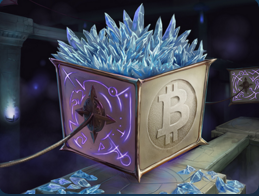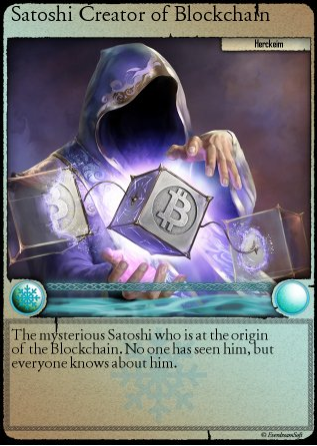Gaming on the blockchain II – A new kind of digital ownership

It's a new era for gamers trading digital assets using tokens or smart contracts, creating decentralised marketplaces using tamper-proof public blockchains. The effect is transparency in what was considered to be a permanently grey market, fought over for years by the likes of Brock Pierce's Internet Gaming Entertainment. New platforms are poised to launch, while some existing ones are making money hand over fist.
Part one of this series looked at the revolutionary token-based platform FreeMyVunk and the self-styled overlord of high value digital assets, Jon Neverdie Jacobs. This part looks at more offerings in the space and delves deeper into the question of digital asset ownership. It will be interesting to see how these new paradigms of digital ownership, and a rising tide of decentralised platforms play out with big incumbents.
Spells of Genesis
Spells of Genesis (SoG), a mobile game which mixes the collection and strategic aspects of trading cards with the addictiveness of arcade games, provides proof that the blockchain concept works with today's technology. SoG is exploring "true ownership" for users, whereby all the game's assets are stored on the blockchain.
SoG issued its own game currency called BitCrystals, which were sold during a crowdfunding that raised over 930 bitcoin (around $300,000). The system uses the Bitcoin blockchain via Counterparty to issue BitCrystals, which are now traded on major crypo-exchanges like ShapeShift and Poloniex. The currency is limited, so if demand for game assets increases then the value of BitCrystals increases proportionally. To sell cards SoG uses clever asset vending machines called Swapbots developed by Adam Levine's Tokenly service.
Shaban Shaame, founder, EverdreamSoft, which created SoG, said: "We put our game cards on sale in the vending machine and then you can configure the vending machine to say 'I accept 0.1 bitcoin and I give back one card, or I give back one BitCrystal. Then when you send funds or assets to that machine, it processes it and sends you back your asset.

"Right now it's our core business. We are doing lots of volume selling cards through those swapbots. For example, we sold for $100 value per unit and when we opened it on sale, we had flash sales, after two or three seconds they were sold out."
Shaame said he likes Ethereum (in a recent tweet SoG said it was part of the FreeMyVunk reVUNKolution on Ethereum) but chose Counterparty because it's more mature and can be used with a light wallet on a phone.
He claimed not to be a technologist but was simply focused on the end product and making the crypto part frictionless and as invisible as possible. He said it's hard to get the average mainstream gamer into the Bitcoin ecosystem; they are accustomed to using their credit cards or Google or Apple account to pay.
However, they stand to gain access to a new way of owning and trading digital assets by virtue of using new decentralised marketplaces. Shaame said: "Every product has its closed ecosystem so I cannot make a transaction where I transfer you an asset directly without going through the whole game database."

He said we are perhaps at the first stages of a "reachable digital capital". In contrast to our real world capital which is the sum of all things we own – house, car etc. – when it comes to digital worlds, we don't seem to own anything digital.
"If you purchase a Windows licence then it's tied to you but you cannot transfer it, or if you purchase music on iTunes you have a right to listen to it but it's not yours.
"With blockchain when you purchase SoG cards it adds to your overall capital, and the capital could be the cards you own, or it could be songs that are represented with an asset. If you want to purchase something else you should be able to liquidate a part of your assets and swap this for something else."
AvatarTrader and Ownage
This sentiment is shared by others, either in stealth or in the process of launching. Slated to go live in March is AvatarTrader; the platform is yet to announce but founder Kyle Berkley told IBTimes UK that the new service would be "along the lines" of gaming and blockchain.
He said: "10 years ago I was ripped off by someone when I was trying to sell my Avatar. I was going to take the money from selling my Monk and buy a Shaman of the same value. I wanted to play a different class to keep the game exciting. I was not, and I am not the only one who is getting ripped off.
"Over these years I have been in contact with many people who would like to have the opportunity to be part of our mission. To provide Safe and confident trading of your avatar amongst other traders.Trading is important! Instead of being able to just buy an advantage and skip content, you can transfer all your hard work over to a new Avatar. It reminds me of being able to switch characters in Mortal Kombat or Street Fighter. If you were always the same fighter, the game would get old fast. In MMO's you have to spend a lot more of your time leveling up, and often see the same content over and over. Trading keeps the value of your character while making your game new again."
Also heading to market is a platform being developed by long-time games developer and blockchain expert Alex Amsel. It's a smart contract-based system on the Ethereum public blockchain called "ownage", to deal with the ownership and exchange of digital items, specifically relating to games. This could be in-app purchases, collectible items, limited edition-type stuff, trading cards, or games themselves.
Amsel said a public blockchain delivers an open platform which means open business models with a lot of transparency. "It means people, including developers, are in control of their own destiny, as opposed to being subject to the whims of whoever the platform holder is that they currently have to sell though.
"Also it helps to deal with some of the problems of trading; Valve has an app called 'Steam' and they support trading of items within that. They have had a lot of security issues and a lot of fraud issues. Using a system like the one we are designing can massively reduce this and at the same time open up a bigger market."
Amsel pointed out that we don't actually want to trust ownership of our digital goods to the likes of Apple, Google or Facebook, any more than we trusted Microsoft to replace the internet in the mid-1990s.
"What we want is a system where we own what we own but we might experience it through Facebook or Apple or Google. At the moment the experience of it and the ownership of it, they are all tied. Currently, you buy music on iTunes and it's tied to iTunes. However, it's your music - you experience it through iTunes at first but should have the option to take it with you elsewhere. That's how it should be."
"If you are in absolute control of that ownership, then how you might experience it – whether it's a physical product or a digital product or a ticket to a gig – that's separate from the fact that you bought it or you were given it. Right now you can only do what Apple, Microsoft, Sony, Nintendo or Valve offer. In the future I think it's going to be very interesting to see what happens."
Content creation and video streaming on the blockchain
Blockchains enable new types of social and economic relationships between people and in the context of gaming this opens up new, experimental avenues for small indie developers and also whole ecosystems around user-generated content.
Peter Borah, decentralised engineer with the ConsenSys studio, sees news possibilities in the example of Super Mario Maker, a game creation and publishing tool which allows players to create their own levels and then publish these to the internet.

Borah said: "You have people trading levels for the game and all that activity is sort of organised by the game. But there is no way to add an economic component to it right now. If you want to reward your players for creating good levels, maybe Nintendo could do that but it's a big hassle. You would need the resources of Nintendo to make that program work.
"With blockchain you could automate all that. People who submit good levels, as determined by other player's ratings can get automatically rewarded for doing so, just by putting some of the data about the levels on the blockchain. People's ratings can also go up on the blockchain, and then have a contract that does a revenue share every month and automatically goes out to people whose levels have a lot of status."
Borah also cited the world of streaming, such as Amazon subsidiary Twitch.tv, as another experimental space, where lines could be blurred by value transfer. "I think that the relationship between the people playing the game and people watching is really interesting. There are places blockchain could alter that. People watching streamers like to donate to them and can already do that, there are tools for that."
"If the game was fully integrated with Ethereum you might ask the streamer to play one of your levels in exchange for this donation. So it's a transaction where I'm going to give you something and in order for you to provide me a certain sort of entertainment."
© Copyright IBTimes 2025. All rights reserved.






















